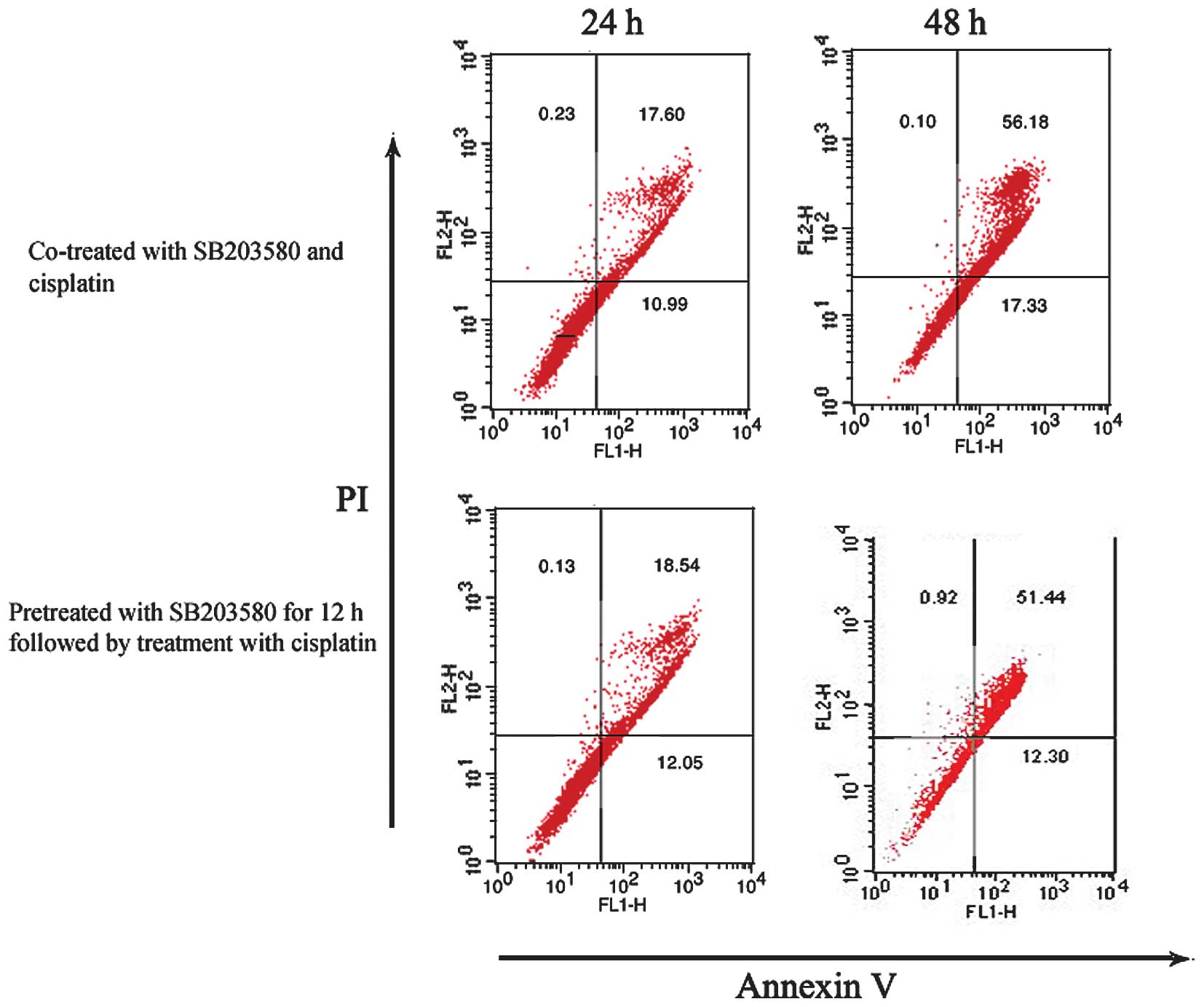|
1
|
Lee HJ, Kim MS, Shin JM, Park TJ, Chung HM
and Baek KH: The expression patterns of deubiquitinating enzymes,
USP22 and Usp22. Gene Expr Patterns. 6:277–284. 2006. View Article : Google Scholar : PubMed/NCBI
|
|
2
|
Zhang XY, Varthi M, Sykes SM, Phillips C,
Warzecha C, Zhu W, Wyce A, Thorne AW, Berger SL and McMahon SB: The
putative cancer stem cell marker USP22 is a subunit of the human
SAGA complex required for activated transcription and cell-cycle
progression. Mol Cell. 29:102–111. 2008. View Article : Google Scholar : PubMed/NCBI
|
|
3
|
Zhao Y, Lang G, Ito S, Bonnet J, Metzger
E, Sawatsubashi S, Suzuki E, Le Guezennec X, Stunnenberg HG,
Krasnov A, et al: A TFTC/STAGA module mediates histone H2A and H2B
deubiquitination, coactivates nuclear receptors, and counteracts
heterochromatin silencing. Mol Cell. 29:92–101. 2008. View Article : Google Scholar : PubMed/NCBI
|
|
4
|
Atanassov BS and Dent SY: USP22 regulates
cell proliferation by deubiquitinating the transcriptional
regulator FBP1. EMBO Rep. 12:924–930. 2011. View Article : Google Scholar : PubMed/NCBI
|
|
5
|
Lin Z, Yang H, Kong Q, Li J, Lee SM, Gao
B, Dong H, Wei J, Song J, Zhang DD, et al: USP22 antagonizes p53
transcriptional activation by deubiquitinating Sirt1 to suppress
cell apoptosis and is required for mouse embryonic development. Mol
Cell. 46:484–494. 2012. View Article : Google Scholar : PubMed/NCBI
|
|
6
|
Sussman RT, Stanek TJ, Esteso P, Gearhart
JD, Knudsen KE and McMahon SB: The epigenetic modifier
ubiquitin-specific protease 22 (USP22) regulates embryonic stem
cell differentiation via transcriptional repression of
sex-determining region Y-box 2 (SOX2). J Biol Chem.
288:24234–24246. 2013. View Article : Google Scholar : PubMed/NCBI
|
|
7
|
Kim S, Kang JK, Kim YK, Seo DW, Ahn SH,
Lee JC, Lee CH, You JS, Cho EJ, Lee HW, et al: Histone deacetylase
inhibitor apicidin induces cyclin E expression through Sp1 sites.
Biochem Biophys Res Commun. 342:1168–1173. 2006. View Article : Google Scholar : PubMed/NCBI
|
|
8
|
Xiong J, Xu X, Zhou X, Liu J, Gong Z, Wu P
and Li W: USP22 transcriptional activity is negatively regulated by
the histone deacetylase inhibitor trichostatin A. Mol Med Rep.
10:3343–3347. 2014.PubMed/NCBI
|
|
9
|
Qi X, Tang J, Pramanik R, Schultz RM,
Shirasawa S, Sasazuki T, Han J and Chen G: p38 MAPK activation
selectively induces cell death in K-ras-mutated human colon cancer
cells through regulation of vitamin D receptor. J Biol Chem.
279:22138–22144. 2004. View Article : Google Scholar : PubMed/NCBI
|
|
10
|
Yang G, Zhang Y, Wu J, Xiong J, Deng H,
Wang J, Yang C and Zhu Z: Osteopontin regulates growth and
migration of human nasopharyngeal cancer cells. Mol Med Rep.
4:1169–1173. 2011.PubMed/NCBI
|
|
11
|
Glinsky GV: Death-from-cancer signatures
and stem cell contribution to metastatic cancer. Cell Cycle.
4:1171–1175. 2005. View Article : Google Scholar : PubMed/NCBI
|
|
12
|
Ovaa H, Kessler BM, Rolen U, Galardy PJ,
Ploegh HL and Masucci MG: Activity-based ubiquitin-specific
protease (USP) profiling of virus-infected and malignant human
cells. Proc Natl Acad Sci USA. 101:2253–2258. 2004. View Article : Google Scholar : PubMed/NCBI
|
|
13
|
Boutros T, Chevet E and Metrakos P:
Mitogen-activated protein (MAP) kinase/MAP kinase phosphatase
regulation: Roles in cell growth, death, and cancer. Pharmacol Rev.
60:261–310. 2008. View Article : Google Scholar : PubMed/NCBI
|
|
14
|
Xiong J, Che X, Li X, Yu H, Gong Z and Li
W: Cloning and characterization of the human USP22 gene promoter.
PLoS One. 7:e527162012. View Article : Google Scholar : PubMed/NCBI
|
|
15
|
Dashti SR, Efimova T and Eckert RL: MEK6
regulates human involucrin gene expression via a p38alpha - and
p38delta -dependent mechanism. J Biol Chem. 276:27214–27220. 2001.
View Article : Google Scholar : PubMed/NCBI
|
|
16
|
Hernandez Losa J, Parada Cobo C, Guinea
Viniegra J, Sanchez-Arevalo Lobo VJ, Ramony Cajal S and
Sanchez-Prieto R: Role of the p38 MAPK pathway in cisplatin-based
therapy. Oncogene. 22:3998–4006. 2003. View Article : Google Scholar : PubMed/NCBI
|
|
17
|
Cain BS, Meldrum DR, Meng X, Dinarello CA,
Shames BD, Banerjee A and Harken AH: p38 MAPK inhibition decreases
TNF-alpha production and enhances postischemic human myocardial
function. J Surg Res. 83:7–12. 1999. View Article : Google Scholar : PubMed/NCBI
|
|
18
|
Ma W, Lim W, Gee K, Aucoin S, Nandan D,
Kozlowski M, Diaz-Mitoma F and Kumar A: The p38 mitogen-activated
kinase pathway regulates the human interleukin-10 promoter via the
activation of Sp1 transcription factor in
lipopolysaccharide-stimulated human macrophages. J Biol Chem.
276:13664–13674. 2001.PubMed/NCBI
|
|
19
|
Bulavin DV and Fornace AJ Jr: p38 MAP
kinase's emerging role as a tumor suppressor. Adv Cancer Res.
92:95–118. 2004. View Article : Google Scholar : PubMed/NCBI
|
|
20
|
Hamidouche Z, Fromigue O, Nuber U, Vaudin
P, Pages JC, Ebert R, Jakob F, Miraoui H and Marie PJ: Autocrine
fibroblast growth factor 18 mediates dexamethasone-induced
osteogenic differentiation of murine mesenchymal stem cells. J Cell
Physiol. 224:509–515. 2010. View Article : Google Scholar : PubMed/NCBI
|
|
21
|
Alderton F, Humphrey PP and Sellers LA:
High-intensity p38 kinase activity is critical for p21(cip1)
induction and the antiproliferative function of G(i)
protein-coupled receptors. Mol Pharmacol. 59:1119–1128.
2001.PubMed/NCBI
|
|
22
|
Lafarga V, Cuadrado A, Lopez de Silanes I,
Bengoechea R, Fernandez-Capetillo O and Nebreda AR: p38
Mitogen-activated protein kinase- and HuR-dependent stabilization
of p21(Cip1) mRNA mediates the G(1)/ S checkpoint. Mol Cell Biol.
29:4341–4351. 2009. View Article : Google Scholar : PubMed/NCBI
|
|
23
|
Kumari G, Ulrich T and Gaubatz S: A role
for p38 in transcriptional elongation of p21 (CIP1) in response to
Aurora B inhibition. Cell Cycle. 12:2051–2060. 2013. View Article : Google Scholar : PubMed/NCBI
|
|
24
|
Olson JM and Hallahan AR: p38 MAP kinase:
A convergence point in cancer therapy. Trends Mol Med. 10:125–129.
2004. View Article : Google Scholar : PubMed/NCBI
|



















